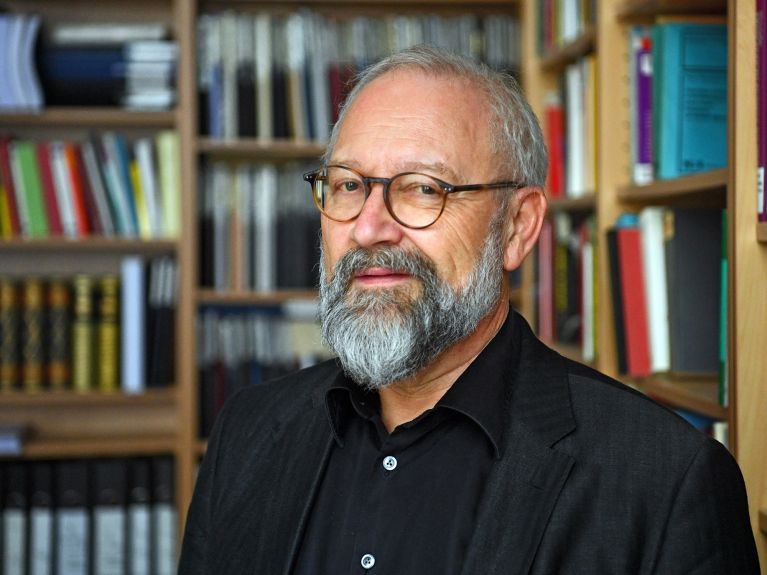“Respond more sensitively to conflicts”
How the First World War continues to this day: the political scientist Herfried Münkler discusses lessons learned from the mistakes of the past.

Professor Herfried Münkler teaches at the Humboldt University in Berlin and is one of the most renowned German political scientists and historians of ideas. His overall depiction of the First World War, Der Große Krieg: Die Welt 1914 bis 1918 (The Great War: The World 1914-1918), was published in 2013.
Professor Münkler, how do the effects of the First World War continue today?
In the collective memory of the Germans, the First World War is essentially linked to the confrontation with France. This has to do with the trench warfare on the Western Front, with the attrition warfare practiced there, but also with the Versailles Peace Treaty, which was felt to be a humiliation in Germany. This is a separate thread of history that led, via Hitler’s war of revision in the Second World War, to the German-French reconciliation between de Gaulle and Adenauer in Reims and between Mitterrand and Kohl in Verdun.
This is a historically completed chapter, in which the war is only a distant memory serving as a legitimation narrative for the European Union – at least for its Paris-Berlin axis. The shudder of the past is cultivated in order to consolidate the established order.
Are there any current conflicts that can be traced to the situation after the end of the war?
In south-eastern Europe, parts of Eastern Europe and the Middle East, there are conflicts that are to a large extent the result of the end of the First World War. In the Danube monarchy, the Tsarist empire and the Ottoman Empire there existed until 1917/1918 three multinational, multi-religious and multilingual empires which ensured that national, religious and linguistic differences were not transformed into political dividing lines and then escalated into declarations of friend and foe.
Between 1919 and 1938, and the beginnings of Hitler’s revisionist policy, a number of wars were fought in these regions: Poland against the Soviet Russia for Galicia, Hungary against Romania for Transylvania, Greece against Turkey for the territory of Smyrna. These wars were accompanied by expulsions and resettlements. Yugoslavia and the Soviet Union, the latter founded in 1922, followed the tradition of depoliticizing ethnic and religious differences. When these states fell apart in the 1990s, the Balkan wars and the wars in the Caucasus ensued.
These wars have been ended. But the lines of conflict are still latent. They are the fuses of powder kegs, which can easily catch fire. The Israeli-Palestinian conflict also had its beginnings in the First World War.
In 1914 political centres of power didn’t take the conflict on the fringes of Europe seriously and underestimated its politically explosive force.
What findings emerge from the experiences of the First World War for the solution of crises in and outside of Europe?
Much of what we believe is politically irrelevant is still explosive in other geographic areas. We saw this during the Yugoslav wars of secession. But we “unlearned” it quickly because it was too perplexing for our worldview. Looking away, however, doesn’t change the constellations.
In a way, that was also the problem in the summer of 1914: the political centres of power didn’t take the conflict on the fringes of Europe seriously and underestimated its political explosive force. Never underestimate the importance of the periphery for the centre. This is the first lesson for the treatment of today’s crises.
The second lesson is that ethnic and religious conflicts smoulder. They develop underground until they boil up through systematic provocations. You need more sensitive early warning systems than for purely political conflicts. And you must not forget that such wars continue to smoulder even after their official termination. Often they also have a social component. Violence is then a political means to redistribute resources and employment opportunities. Anyone who wants a stable peace must buy off the use of force: either through redistribution in the country in question or subsidies from outside.
When it comes to resentment, remembrance culture is war-amenable because it reminds us that bills are still open.
How important is a pan-European culture of remembrance?
A culture of remembrance of the destruction of wars makes sense if, on the balance, everyone has lost: sons and fathers, material values, life chances. This is the case in the war between Germany and France, which was about interests, power and influence. Here the cost-benefit balance sheets speak against war, so that all culture of remembrance is war-averse.
This is quite different, however, when it comes to resentment, revenge, the need for revenge and unconditional values and truths, such as those of a religion. Here remembrance culture is war-amenable because it reminds the commemorators that there are still some bills left open.
Wars like the one the Germans and the French fought against each other may be a thing of the past. But this doesn’t apply to the “new wars”, which often pay out for those who commit the violence. Such wars take place on the periphery of the prosperous zones. But they can spread to the centres; that’s why we’re not immune to them.
Remembrance culture is important and helpful if it leads us not to lose sight of such dangers.
Interview: Tanja Zech
© www.deutschland.de
